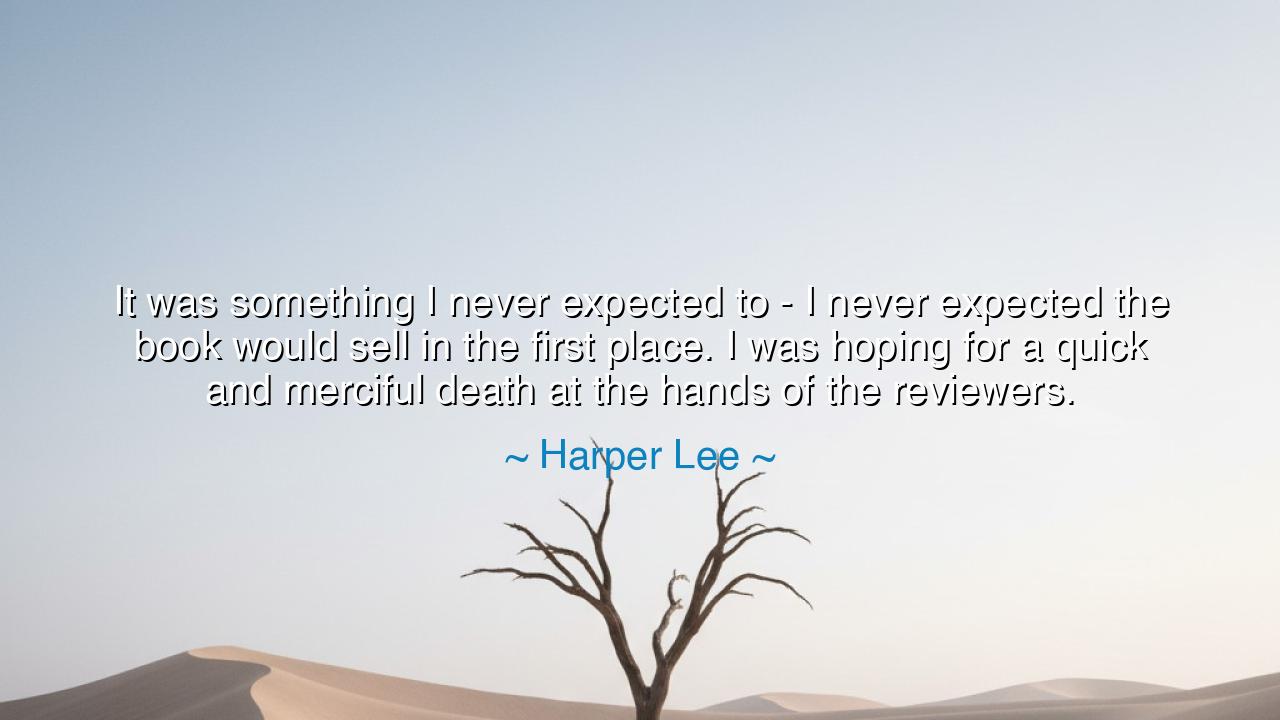
It was something I never expected to - I never expected the book
It was something I never expected to - I never expected the book would sell in the first place. I was hoping for a quick and merciful death at the hands of the reviewers.






The words of Harper Lee, author of the immortal To Kill a Mockingbird, carry the humility of one who never sought glory, but truth: “It was something I never expected to—I never expected the book would sell in the first place. I was hoping for a quick and merciful death at the hands of the reviewers.” In these words, spoken with quiet humor and deep sincerity, we hear the confession of an artist who trembled before the unknown. Her statement is not only about fame or success—it is about the fear of failure, the vulnerability of creation, and the unpredictable nature of art and destiny.
In the ancient manner, her words might be likened to the utterance of a craftsman who shapes a statue from stone and then steps back, uncertain whether it is a masterpiece or a ruin. For Harper Lee was not driven by vanity, but by vision. She wrote from her heart, not knowing what judgment the world would pass upon her offering. The book, to her, was a fragile child sent into the world’s storm, and she feared the coldness of its reception. To wish for “a quick and merciful death” from the reviewers was to brace for rejection—to hope that disappointment would come swiftly, rather than linger in pain. Yet fate, with its endless irony, turned her fear into triumph.
Her novel, born from humility, became one of the most powerful works of the modern age—a moral compass for generations. But this is the great paradox of creation: those who seek greatness rarely find it, while those who speak sincerely to the soul often achieve what they never imagined. Harper Lee, like the prophets and poets of old, did not aim to conquer the world; she aimed to tell the truth. And truth, once spoken, has a life of its own. Her fear of failure was the shadow that accompanies every true artist—the shadow that proves they care deeply for what they have made.
In her journey, we see a reflection of countless souls who dared to create amidst doubt. Consider Vincent van Gogh, who died in poverty, never knowing that his paintings would one day move the hearts of millions. He, too, might have hoped for a “merciful death” of his art—an end to struggle and ridicule. Yet, like Harper Lee, he planted seeds that would only bloom after his time. Both artists reveal a universal truth: that creation is an act of courage, not certainty. One must give birth to something unseen, trusting that the world will one day understand.
Harper Lee’s humility also speaks to the danger of expectation. She expected nothing, and therefore was not enslaved by the pursuit of fame or praise. In this, she embodies the wisdom of the ancients, who taught that the purest acts are done without thought of reward. The Stoics said: “Do the work well, and let go of the outcome.” Lee’s words echo this timeless counsel. She feared the critics but still wrote; she doubted success but still spoke her truth. Her victory lay not in the book’s fame, but in the courage to create despite uncertainty.
Her quote also teaches us that greatness often walks hand in hand with modesty. Those who shout their own praises rarely echo through history; those who speak quietly from the heart often never fade. Lee’s unexpected triumph reminds us that our most sincere efforts—those done with honesty rather than ambition—carry the deepest power. For when the motive is pure, the creation becomes immortal.
Lesson and Practice:
When you create, when you speak, when you strive for something meaningful, do so not for applause, but for truth. Expect nothing but give everything. Let humility be your companion and courage your guide. When doubt whispers that your work will fail, remember Harper Lee, who feared the world’s judgment but still gave it one of its most enduring stories. Do not measure your worth by the echo of others, but by the purity of your intent. And when you release your creation into the world, let it go with faith—for you cannot know what hidden destiny it may fulfill. In this way, like Harper Lee, you will learn that even the smallest act done in sincerity can ripple through eternity.






AAdministratorAdministrator
Welcome, honored guests. Please leave a comment, we will respond soon